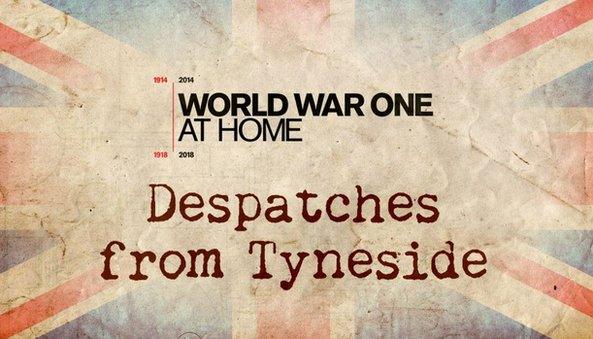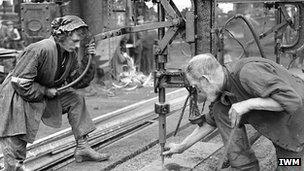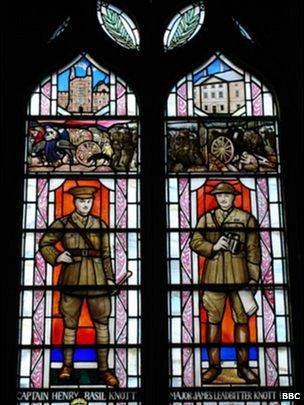New stories emerge about the impact of WW1 on Tyneside
- Published
- comments

A special regional documentary about the effects of the Great War on communities along the Tyne
I have learned so much more about World War One than I could have imagined when I was first asked to produce a documentary about the Great War and its impact on my birthplace.
After all, a century after the outbreak of the war there have been innumerable books, films, articles and research papers published on the topic.
However, locked away in boxes in the loft or lurking in the back of drawers are the real stories of the men who fought and died for their country.
New mapping of Tyneside WW1 victims reveals its impact
In my film we follow the Tynemouth WW1 Commemoration Project, external which has been collecting stories handed down within families.
It has produced a remarkable map which gives a unique insight into the devastating effect the war had on one community.
Seventy volunteers have been documenting addresses and dates to create a timeline that shows how each campaign or event on the battlefield left behind widows, orphans or grieving parents.
It will be launched on their website towards the end of June 2014.
War graves at home
What startled me was how many people died on home ground.
Nineteen mariners were blown up just outside of the Tyne piers on New Year's Eve 1916. They weren't in the navy, they were civilian pilots whose job it is to guide vessels safely into the river.
The pilot cutter Protector was lost with all hands.
The one body that was recovered was given a Commonwealth War Grave. It is one of many in Tynemouth's Preston cemetery.
We're used to hearing stories of how very young men would lie about their age in order to join up.
A Tyneside daughter never forgave herself for helping her father forge his date of birth so he could serve in WW1
However the project uncovered the tale of Joseph Forster who died on the front line after he asked his daughter to forge his birth certificate to make him appear young enough to enlist.
As his grandson Peter Grant told me, Martha felt she had sent her own father to his death and never forgave herself.
I also learned how the shortage of manpower meant boy scouts from Whitley Bay were used to guard the bridges over the Tyne in Newcastle.

Women were drafted in to Tyneside industries such as shipbuilding and armaments
Some were sent north of Bamburgh to do shifts as coastguards.
They were monitoring shipping movements along the coast and keeping an eye peeled for spies who might be landed on our shores.
Lasting legacy
One of the most heart rending stories came from a church I drive past quite regularly but which I hadn't realised was only built because of heartbreak caused by the war.
St James & St Basil was created in the name of James and Basil Knott. The brothers were both killed in action.
James wrote to his father on the first day of the Somme with a premonition he would not return to Tyneside.
Sadly he was proved right as he was killed that very same day.
In his letter he asked his father to get rid of anything that would remind him of his sons.

The window dedicated to Basil and James Knott
Instead he not only had a beautiful stained glass window made, he built the church to put it in and even had the whole parish named after them.
The loss was so deeply felt that Sir James Knott sold his shipping business and gave all his money away to charitable causes.
The trust he founded still gives out around £2m in the North East of England every year.
It's been a fascinating journey of discovery for me.
As moving as it is to see row upon row of headstones in foreign fields, hearing the stories of how it affected people back home makes you realise how a whole community was affected by the loss of a generation of young men.
World War One at Home - Despatches from Tyneside can be seen on BBC One (North East & Cumbria) at 19:30 BST on Monday, 2 June, 2014 and nationwide on the iPlayer for seven days thereafter.